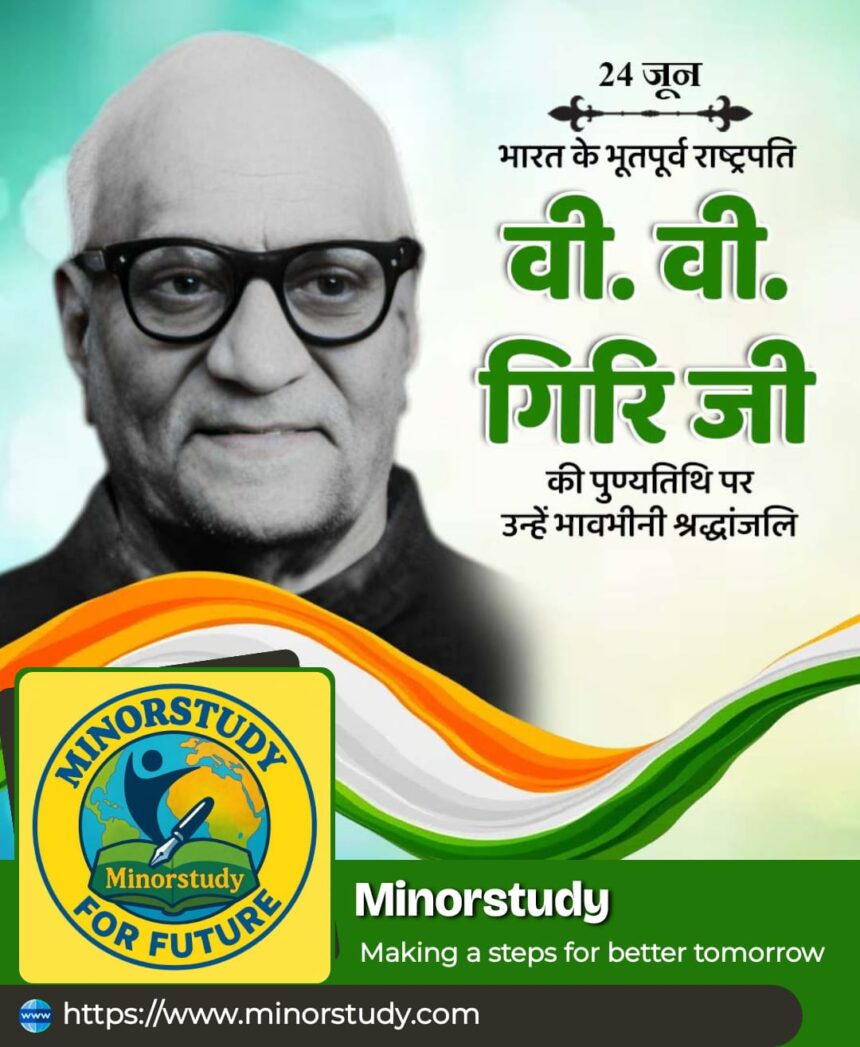🔥 Powerful Reasons Why V.V. Giri Ji’s Legacy Still Shapes India Today
Explore the incredible journey of V.V. Giri Ji—freedom fighter, labour rights advocate, and India’s only independent President. Discover 11 powerful reasons why his legacy still impacts Indian society, governance, and daily life.
- 🕰️ Introduction: Who Was V.V. Giri Ji?
- 📜 Historical Background & Early Life
- 📊 Key Facts About V.V. Giri Ji
- 🗓️ Timeline of Major Life Events
- 💡 11 Powerful Reasons Why V.V. Giri’s Legacy Still Matters
- 🎉 How Is V.V. Giri Remembered Today?
- 🙏 Birthday & Commemorative Wishes
- ❓ FAQs About V.V. Giri Ji
- 🔍 Significance in Our Daily Life
- 🧠 Conclusion: A Legacy Rooted in People
🕰️ Introduction: Who Was V.V. Giri Ji?
Varahagiri Venkata Giri, popularly known as V.V. Giri, was the fourth President of India (1969–1974) and the first and only President elected as an independent candidate. More than just a ceremonial head, he was a freedom fighter, trade unionist, labour rights pioneer, and distinguished statesman. His life was a reflection of dedication to democratic values, social justice, and workers’ welfare.
Born on August 10, 1894, in Berhampur (now in Odisha), V.V. Giri’s journey from a legal scholar in Dublin to India’s top constitutional post is nothing short of remarkable.
📜 Historical Background & Early Life
Birthplace: Berhampur, Madras Presidency (now Odisha), 1894
Parents: V.V. Jogaiah Pantulu, a nationalist and Congress leader
Education: BA from Madras University, Law from University College Dublin
Inspiration: Irish Home Rule Movement deeply influenced him
Joined Indian National Congress: After returning from Ireland in 1916
Arrested: Multiple times during the Non-Cooperation Movement and Quit India Movement
He was deeply committed to Mahatma Gandhi’s ideals, and his active participation in the freedom struggle laid the foundation for his lifelong advocacy for labour rights and democratic socialism.
📊 Key Facts About V.V. Giri Ji
| Key Information | Details |
|---|---|
| Full Name | Varahagiri Venkata Giri |
| Born | August 10, 1894, Berhampur, Odisha |
| Died | June 23, 1980 |
| President of India | 4th (1969–1974) |
| Vice President of India | 3rd (1967–1969) |
| Governor Roles | Uttar Pradesh, Kerala, Mysore |
| Awards | Bharat Ratna (1975) |
| Notable Work | “Labour Problems in Indian Industry” |
| Known For | Labour advocacy, constitutional authority, independence |
| Political Affiliation | Independent (as President candidate) |
🗓️ Timeline of Major Life Events
1894: Born in Berhampur, Odisha
1913-1916: Studied Law in Dublin, Ireland
1916: Returned to India and joined the Congress
1922-1947: Active in freedom movement, imprisoned multiple times
1947-1951: First High Commissioner to Ceylon (now Sri Lanka)
1957-1967: Governor of UP, Kerala, and Mysore
1967: Became Vice President of India
1969: Elected President of India (as an independent candidate)
1975: Awarded Bharat Ratna
1980: Passed away in Madras (Chennai)
💡 11 Powerful Reasons Why V.V. Giri’s Legacy Still Matters
Independent Presidency
Giri was elected without any political party support, a historic and bold move that showcased the strength of Indian democracy.Voice of the Workers
As a trade unionist, Giri represented and fought for millions of Indian labourers, advocating for fair wages and workers’ rights.Labour Reforms
He played a pioneering role in shaping labour policies, including the Industrial Disputes Act and Wage Boards.Intellectual Statesman
His books and lectures on labour relations remain valuable references for policy makers even today.Constitutional Authority
During his presidency, Giri upheld the dignity of the office and managed turbulent political situations with balance.National Unity Symbol
Giri stood as a symbol of national integrity, uniting various states and communities through his administrative roles.Promoted Education & Diplomacy
As High Commissioner to Ceylon, he was instrumental in laying down the foundations of India’s foreign policy with neighbours.Fought Caste & Class Inequality
Giri’s policies and actions always leaned toward uplifting the marginalized and ensuring equal rights.Bharat Ratna Honor
His contributions earned him India’s highest civilian award, further validating his importance.Role in 1969 Presidential Crisis
Giri skillfully navigated political tensions after Nehru’s death and during Indira Gandhi’s rise.Legacy of Clean Governance
Despite holding powerful positions, he remained non-corrupt, humble, and people-centric.
🎉 How Is V.V. Giri Remembered Today?
Birth Anniversary (August 10) is observed in educational institutions and by trade unions.
Labour organizations commemorate his contributions during May Day (Labour Day).
Several universities, roads, and government buildings are named after him, especially in Odisha, Andhra Pradesh, and Tamil Nadu.
🙏 Birthday & Commemorative Wishes
“Let us remember the labourers’ President – V.V. Giri Ji – whose vision still lights India’s democratic path.”
“Tributes to V.V. Giri Ji, a true people’s leader and fearless voice for workers.”
“On his birth anniversary, we salute the man who fought for every Indian worker’s dignity.”
❓ FAQs About V.V. Giri Ji
Q1. What is V.V. Giri famous for?
He is best known as the only independent President of India and for his strong advocacy of labour rights.
Q2. Was V.V. Giri a freedom fighter?
Yes. He participated actively in the Non-Cooperation and Quit India Movements and was jailed multiple times.
Q3. Which Indian award did he receive?
He was awarded the Bharat Ratna in 1975.
Q4. Did he hold any position before becoming President?
Yes, including Vice President, Governor of multiple states, and High Commissioner to Ceylon.
Q5. What are some institutions named after him?
V.V. Giri National Labour Institute
V.V. Giri Hall in universities
Roads and memorials across southern India
🔍 Significance in Our Daily Life
Even decades after his passing, V.V. Giri Ji’s vision influences Indian policy today:
Labour Laws like ESI, Gratuity, and Wage Acts have roots in his efforts
His ethical leadership model is taught in civics and administrative studies
Trade unions still quote his speeches to push for better policies
His non-partisan approach in politics is a reminder of how institutions must function independently
🧠 Conclusion: A Legacy Rooted in People
V.V. Giri Ji wasn’t just a politician—he was a thinker, fighter, administrator, and reformer. His legacy reminds us that true leadership lies in humility, fairness, and justice. In today’s world of political polarization, V.V. Giri Ji’s life urges us to respect institutions, value workers, and uphold democracy without bias.








